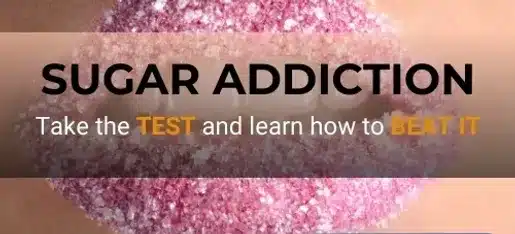Sugar addiction is a common problem that affects many people all over the world. It is a condition where you experience intense cravings for sugary foods and drinks, and find it difficult breaking free from these cravings. If you are struggling with sugar, or food addiction, you are not alone. With the right help and support, you can break free from the sugar shackles and live a healthier, happier life. In this comprehensive guide, we will explore the different aspects of sugar addiction and provide you with practical tips and strategies to overcome it.
Understanding sugar addiction: What is it and why is it difficult to overcome?
Sugar addiction is a complex condition that involves both physical and psychological factors. Sugar consumption triggers the release of dopamine in your brain, which gives you a sense of pleasure and reward. Over time, your brain becomes desensitised to this reward, and you need to consume more sugar to get the same level of pleasure. This leads to a cycle of addiction, where you crave more and more sugar to feel good.
Breaking free from sugar, or food addiction can be difficult because it involves both physical and psychological withdrawal symptoms. When you stop consuming sugar, you may experience headaches, fatigue, mood swings, and other uncomfortable symptoms. These symptoms can make it challenging to stick to a sugar-free lifestyle.
The impact of sugar addiction on your health and well-being
Sugar addiction can have a significant impact on your health and well-being. Consuming too much sugar can lead to weight gain, type 2 diabetes, heart disease, and other health problems. It can also affect your mood, energy levels, and mental health. When you consume sugar, it gives you a temporary boost of energy and mood, but this is often followed by a crash that leaves you feeling tired and irritable.
To overcome sugar addiction, it is essential to understand the impact that it is having on your health and well-being. By learning what foods to eat and understanding the negative consequences of sugar consumption, we will motivate you to make healthier choices.
Signs and symptoms of sugar addiction
If you are wondering whether you are addicted to sugar, there are several signs and symptoms to look out for. These include:
- Craving sugary foods and drinks
- Feeling unable to resist sugary foods and drinks
- Consuming sugar, or process foods on a regular basis
- Feeling irritable or anxious when you try to cut back on sugar
- Experiencing withdrawal symptoms when you stop consuming sugar, such as headaches, fatigue, and mood swings.
If you are experiencing these symptoms, get in touch, we can help with all things sugar and processed food addiction.
Alternatively, take our simple Screening Assessment – It’s Free!
The psychology of sugar addiction: Why we crave sugar and how it affects our brain
There are several psychological factors that contribute to sugar addiction. One of the main reasons why we crave sugar is that it gives us a sense of pleasure and reward. When we consume sugar, it triggers the release of dopamine in our brain, which makes us feel good. Over time, our brain becomes desensitised to this reward, and we need to consume more sugar to get the same level of pleasure.
Another psychological factor that contributes to sugar addiction is stress. When we are stressed, our body releases cortisol, which can increase our cravings for sugary foods and drinks. This is because sugar provides a quick source of energy and can help us feel better temporarily.
To overcome sugar addiction, it is essential to understand the psychological factors driving your cravings. With our specialist training identifying your triggers and finding healthier ways to cope with stress and negative emotions will become an instinct.
Breaking the cycle: Tips for reducing sugar cravings and managing withdrawal symptoms
Breaking the cycle of sugar addiction can be challenging, but several strategies can help. One of the best ways to reduce sugar cravings is to eat real, whole foods that includes plenty of protein, healthy fats, complex carbs and lots of fibre. We’ll help you with this, including ways stabilise your blood sugar levels and control those cravings.
Another effective strategy you’ll learn is to manage your stress levels. We help you to practice relaxation techniques such as meditation, or deep breathing. Exercise is also an excellent way to manage stress and reduce sugar cravings. When you exercise, your body releases endorphins, which can help improve your mood and reduce your cravings for sugar.
Finally, it is essential to be patient and kind to yourself. Breaking free from sugar addiction is not easy, and will take time. If you experience withdrawal symptoms, remind yourself that they are temporary and that they will pass.
Creating a sugar-free lifestyle: How to make healthier food choices and find alternatives to sugar
To overcome sugar addiction, it is essential to create a sugar-free lifestyle. This means making healthier food choices and finding alternatives to sugar. One of the best ways to do this is to focus on whole, unprocessed foods high in protein, fibre and healthy fats. These foods are nutrient-dense and can help you feel full and satisfied, more on this later.
Seeking support: Finding professional help and support groups for sugar addiction
If you are struggling with sugar addiction, it is essential to get in touch and enrol in one of our bespoke recovery programs. There are several options to choose from, including our Bronze, Silver or Gold programs, all having personalised content and 1 to 1 support you need to succeed. You’ll also have access to a variety of online support groups to provide you with additional support and encouragement. These groups are a great place to connect with others who are going through similar struggles and share tips and strategies for overcoming sugar addiction.
Dealing with sugar cravings at home, work, and social events
Overcoming sugar addiction can be challenging in different settings. At home, it is essential to remove all processed foods and drinks from your environment and replace them with healthier options. Don’t worry we will help you with this, and how to prepare healthy snacks in advance to avoid reaching for sugary foods when you are hungry.
At work, it can be challenging to avoid processed foods during breaks or at meetings. One strategy is to bring your healthy snacks to work and avoid sugary, processed foods altogether.
Finally, social events can be a minefield for those struggling with sugar addiction. It can be helpful to plan and take healthy snacks to events. You can also talk to your friends and family about your struggles with sugar addiction and ask for their support.
The role of exercise and stress management in overcoming sugar addiction
Exercise and stress management are two essential components of overcoming sugar addiction. Exercise can help reduce stress, improve mood, and reduce sugar cravings. It can also help you feel more energised and motivated to make healthy choices.
Stress management is also critical for overcoming sugar addiction. Stress can trigger cravings for sugary foods and drinks, so it is essential to find healthy ways to manage stress. This can include practising relaxation techniques like meditation, or engaging in activities that you enjoy, such as reading or spending time in nature.
Celebrating your success: Maintaining a sugar-free lifestyle and preventing relapse
On completing our programs, it is important to celebrate your success and maintain a sugar-free lifestyle. This means continuing to make healthy food choices, managing your stress levels, and staying active. Relapse Prevention is your new focus, set goals and reward yourself when you achieve them. Don’t worry, we’re always here if you need help, remember, you’ll have Free access to our groups for as long as you need it.
It is also important to be mindful to prevent relapse. Sugar addiction can be a lifelong struggle, and it is essential to remain vigilant and aware of your triggers. If you do experience a relapse, remember that it is not a failure. Instead, use it as an opportunity to learn and grow and get back on track.
Conclusion: Empowering yourself to overcome sugar addiction and live a healthier life.
In conclusion, sugar addiction is a common problem that can have a significant impact on your health and well-being. However, with our professional help and support, it is possible to break free from the sugar shackles and live a healthier, happier life. By understanding the psychological and physical factors that contribute to sugar addiction, and by implementing practical tips and strategies, you will overcome sugar addiction and create a sugar-free lifestyle. Remember to be patient, kind to yourself, and celebrate your success along the way. With determination and perseverance, you will become empowered to overcome sugar addiction and live a healthier life.
If you or someone you love is struggling with sugar addiction, don’t hesitate.
Remember, you don’t have to do this alone, we’re here to help with sugar addiction





